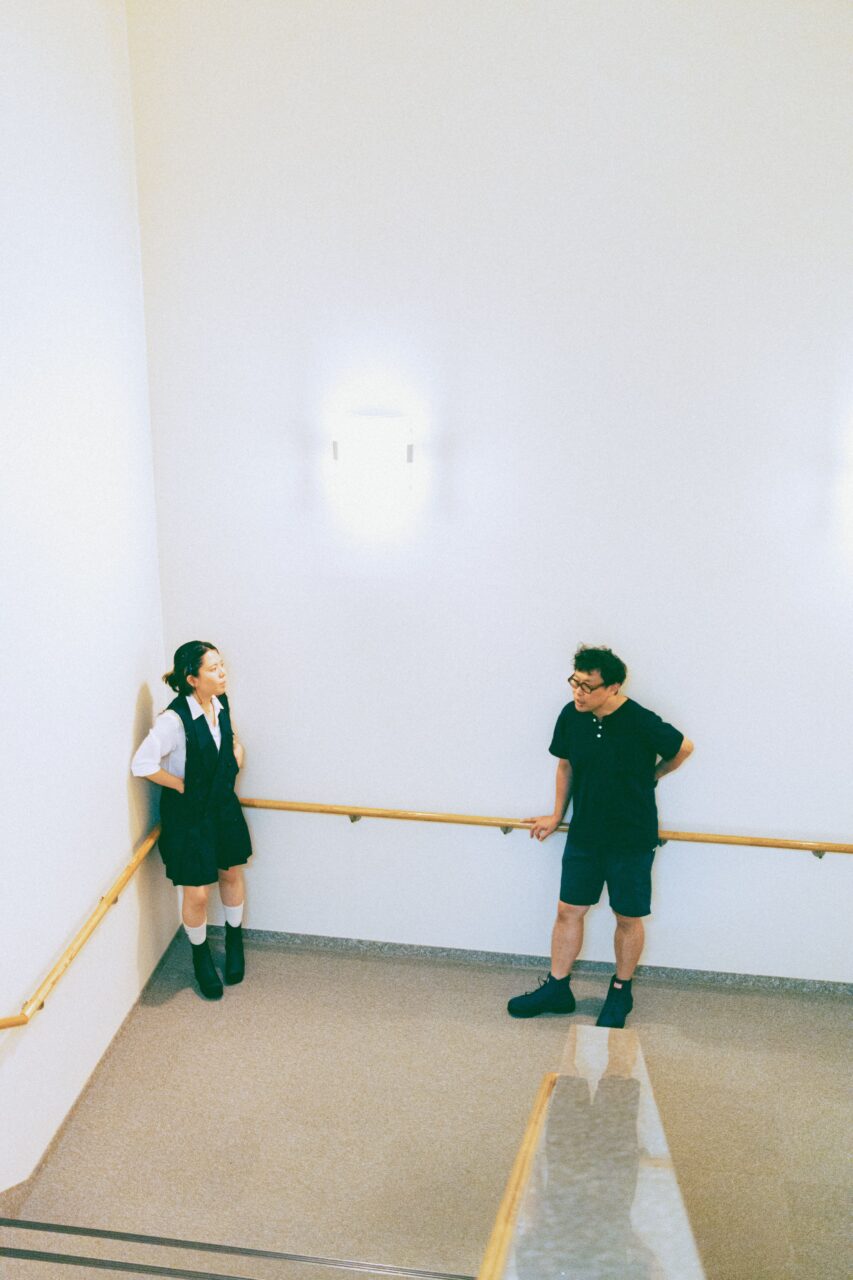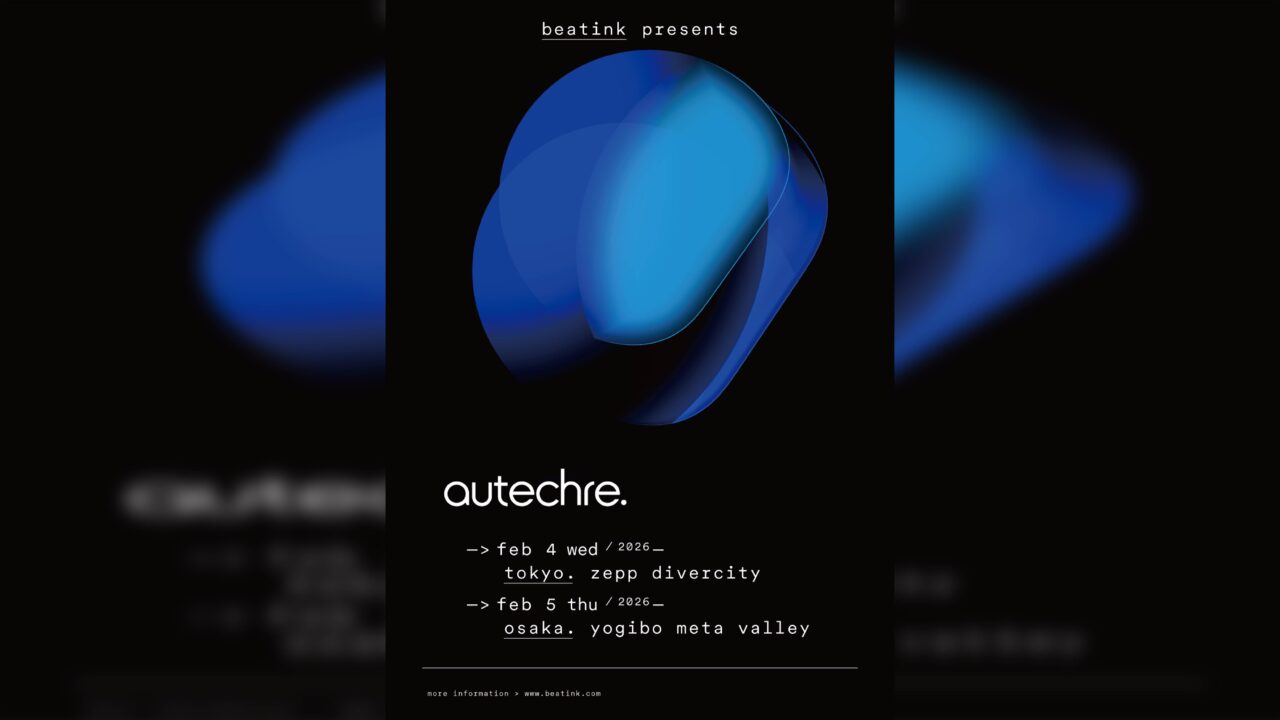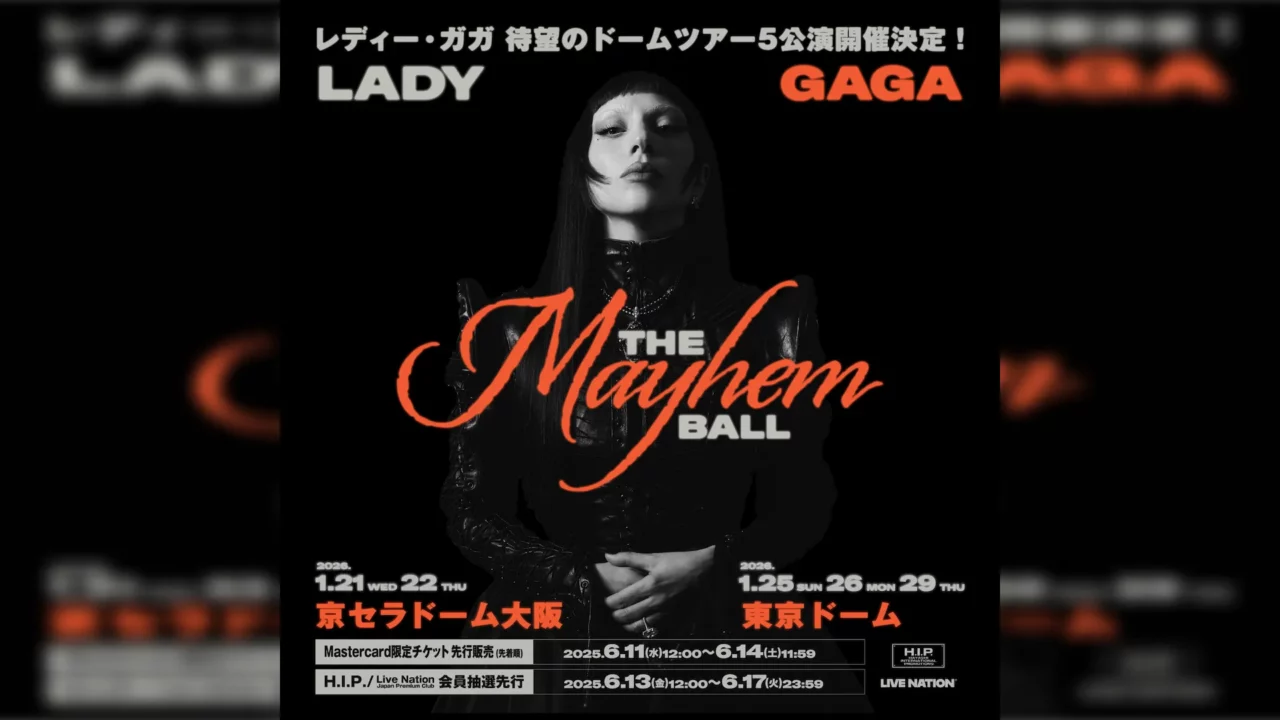Toshiki Okada, the founder of Chelfitsch, is set to revive The Metamorphosis of a Living Room, a play he both wrote and directed, in collaboration with composer Dai Fujikura, as part of Tokyo Festival 2024. Although it’s labeled as a “music drama,” Okada has emphasized in interviews that this work features an incredibly rare and unique synergy between music and theater, where the two art forms are inseparable. Fujikura’s chamber music-style composition is expected to resonate with theater enthusiasts while also appealing to music fans who may not usually engage with plays. The rich and profound sound of the string quartet is sure to impress many. For this revival, Okada has invited musician and singer-songwriter Kaho Nakamura, who experienced the piece during its 2023 performance in Germany, to participate in a dialogue. Their conversation promises to reveal insights that only a musician and a director could uniquely uncover, creating an enriching exchange of ideas.
INDEX
Toshiki Okada and Yoshiho Nakamura: The Moments that Sparked Their Mutual Recognition
Both of you have experienced each other’s work, is that right?
Nakamura: Yes. The first performance I saw was Eraser Forest, a collaboration between Chelfitsch and Teppei Kaneuji, back in 2020. I was thinking, “I have a day off tomorrow; I’d like to go somewhere,” and I noticed the flyer, which piqued my interest, so I decided to attend.

Nakamura: Later, I caught Unfulfilled Ghost and Monster – ZAHA / TSURUGA, which featured my friend Tabito Nanao. I vividly recall how skillfully he was integrated into the performance. Tabito has an incredible ability to convey music and command the stage; he’s like a bard who can play long into the night, even past the last train. However, in Unfulfilled Ghost and Monster, his recurring appearances and swift disappearances throughout the play truly highlighted his musicianship in an intriguing manner.

Born in 1992, Kaho Nakamura is a musician who began her music career in Kyoto at the age of 20. She continues to expand her musicality through various formats, including solo, duo, and band performances. Each time you see her, there are new discoveries to be made, and she is set to broaden her resonance both domestically and internationally. In 2018, she released her album AINOU. In 2019, she released three digital singles and a CD. That same year, she performed at the FUJI ROCK FESTIVAL and organized her own event, Uta no Genzaichi 2019, at Studio Coast in Shin-Kiba, Tokyo, among many other performances. In June 2021, she released “Aimiru.” She also provided the voice and singing for the protagonist Suzu/Belle in Mamoru Hosoda’s latest film, Belle.
Okada: I’m a huge fan of Nakamura’s music. The first song I listened to was “Kitto ne!” and when I heard the line “Kurushii kurai no itami o choudai,” particularly the emphasis on “da,” it struck a chord with me. Once you have an experience like that, she turns into a uniquely special artist in your life.

Playwright / Novelist / Artistic Director of Chelfitsch. His unique relationship between language and body in his techniques has garnered attention, leading to him winning the 49th Kishida Kunio Drama Award in 2005 for “Sangatsu no 5 Nichikan.” Since 2016, he has been consistently involved in the creation and direction of repertoire works at public theaters in Germany. In recent years, he has actively collaborated with artists from various fields, broadening his scope of activities, including directing the opera “Yuzuru” (2021) and writing and directing the Kabuki play “Sakurahime: The Eastern Story” (2023). As a novelist, he won the 2nd Oe Kenzaburo Prize in 2007 for “Watashitachi ni Yurushita Tokubetsu na Jikan no Owari” (Shinchosha) and received the 35th Yukio Mishima Prize and the 64th Kumamoto Literature Prize in 2022 for “Broccoli Revolution” (Shinchosha).
Nakamura: Thank you.
INDEX
Theater That Features Enjoyable Music, Not Music That Supports Theater
This time, from September 20 to September 29, the re-staging of Metamorphosis of a Living Room will take place at the Theater East in Tokyo. Kaho, you actually saw the premiere in Hannover, Germany. What were your impressions?
NAKAMURA: First of all, I was amazed at how beautiful the string sounds were in Europe. In Japan, the high humidity affects the resonance of string instruments significantly. In Germany, the air is drier, which allows the instruments to really sing… The composer is Japanese, right?
Okada: Yes, the composer is Dai Fujikura. He lives in London, though.
Nakamura: The approach to the music was something I had never heard in Japan, and it was shocking to see the theater layered on top of the string sounds. Watching it with Germans was interesting; it felt almost like a dream. Since the days are long, it was still bright outside after the performance. We ended up eating ramen with some Germans afterward, and they kept asking me to explain Okada’s play. I thought to myself, “It’s already difficult to explain even in Japanese,” but I went ahead and talked about it [laughs].
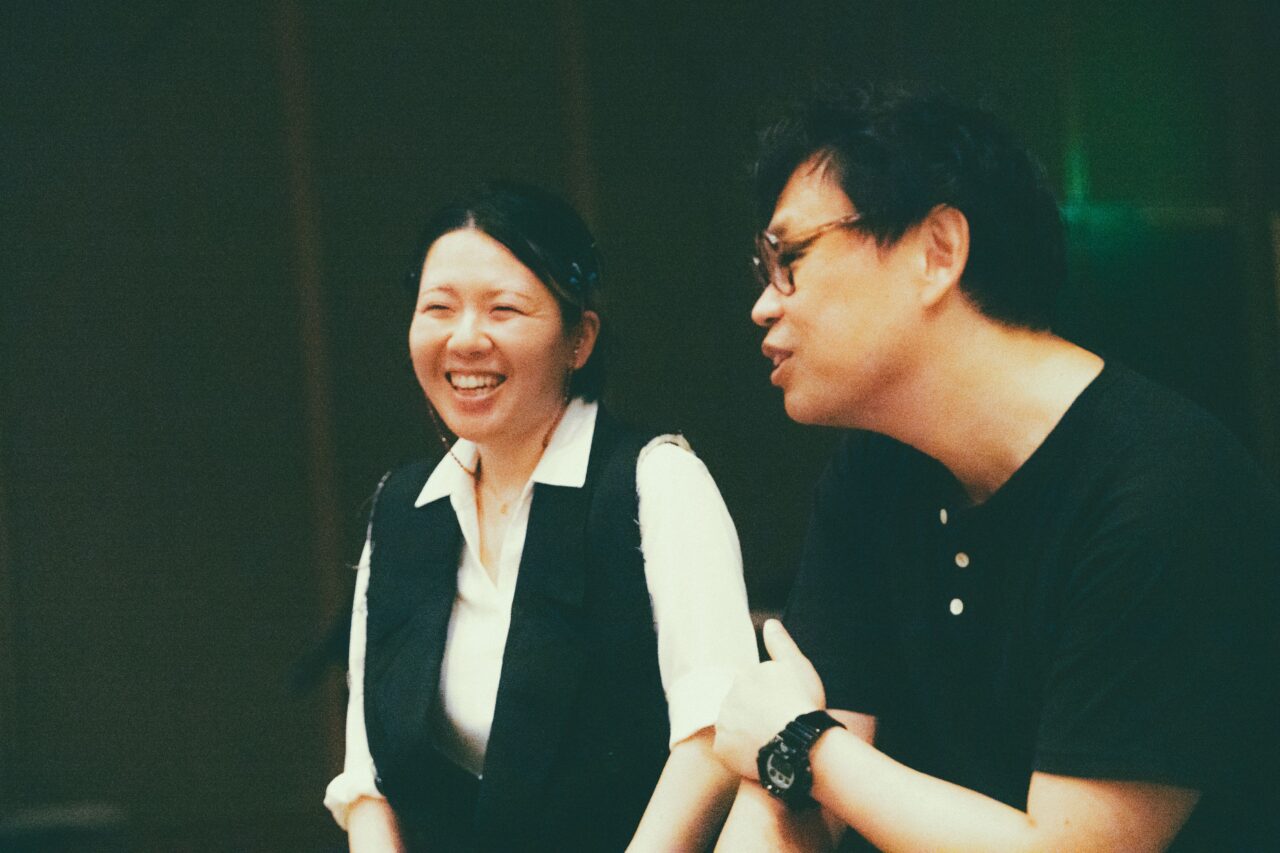
While this production is billed as a musical play, the way music and theater coexist is quite unique, isn’t it? Both elements exist in an equal and parallel manner. The presence of music composed by Dai Fujikura, who has his own distinct “voice” (not in the literal sense), is significant.
Metamorphosis of a Living Room is more than just a musical play with that title; it’s something defined by the tension between music and theater. However, expressing it this way can be difficult to convey. It might not create a clear image for everyone. So reluctantly, we accept being labeled as a musical play. This kind of thing takes time—perhaps decades. Chelfitsch (and surely Dai Fujikura as well) is willing to wait. We have no choice but to wait and keep working steadily. The Tokyo performances are part of that steady effort. By allowing the audience to experience it, we hope to transform the world.
Toshiki Okada (theater playwright, novelist, Chelfitsch founder) comments on the Tokyo performance (written in August 2024)
Okada: Yes, Dai Fujikura resonates with this idea too, but fundamentally, music is not always necessary for theater to exist. For me, that’s a crucial point. It’s not that the production can’t exist without music; rather, it’s not a stance of “we need music to help us.”
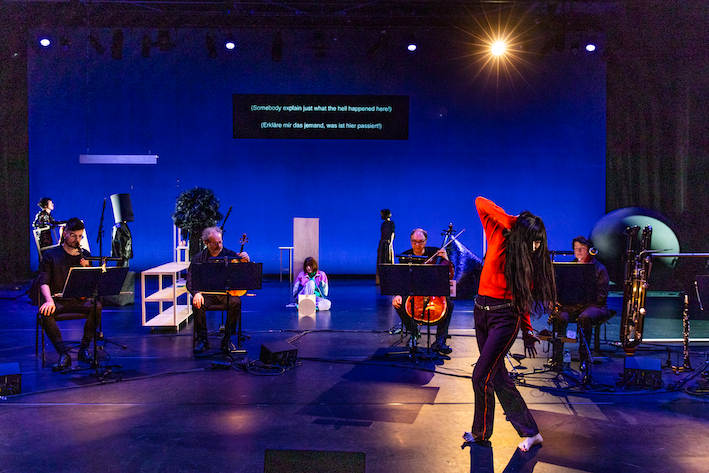
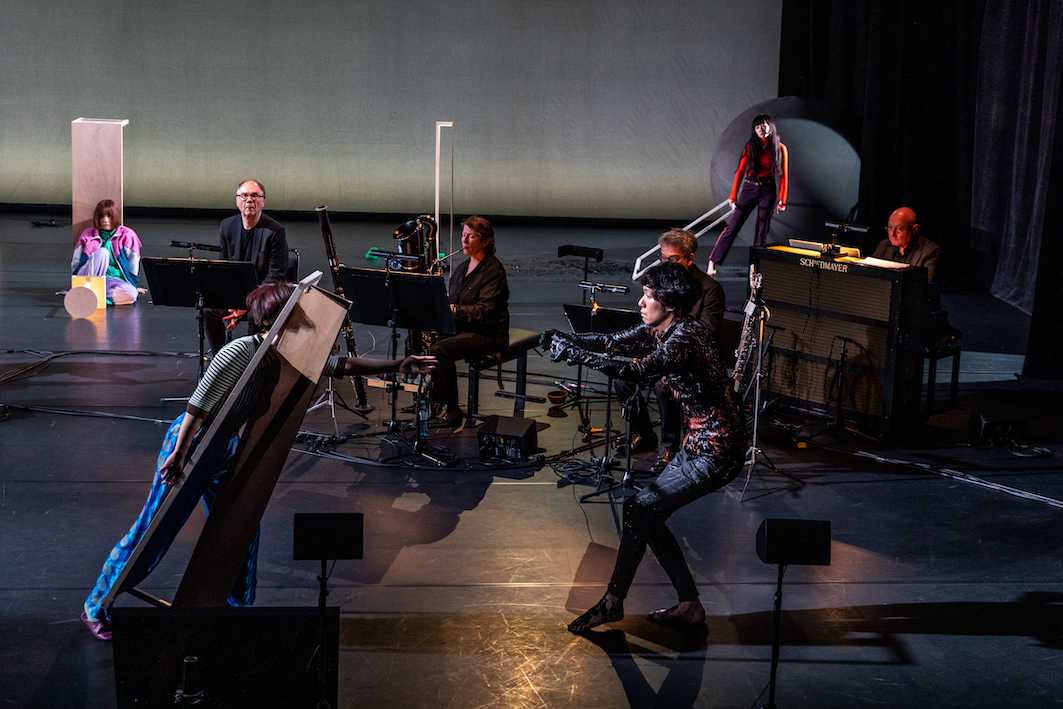
Okada: And I believe that if there is theater that is not dependent on music, it won’t be theater without music; instead, it will be theater that features enjoyable music. When I consider what kind of musicians would make that interesting, I think it’s essential for them to have a unique voice, just as you mentioned. I want not only musicians but also costume designers and lighting designers to have their own distinct voices. This applies to everyone involved in the collaboration.
Normally, if someone says, “Okay, we’ll just remove the music from this play,” most of the time, the production can still stand on its own, right?
Okada: Yes, that’s right. It works.
But Metamorphosis of a Living Room wouldn’t work that way.
Okada: Exactly. If you took away the music composed by Fujikura, it wouldn’t be the same work anymore. The music and the theater exist in a kind of tension, in juxtaposition with each other, so I don’t fully agree with the label of “musical play.” We just call it that for convenience and clarity.
In a sense, something is happening on stage, and the audience is watching, so it encompasses both theater and music, but I think the way it’s perceived is entirely different from other productions. For example, when I listen to music, I don’t think about anything. If I start thinking about something, I can’t enjoy the music. However, when I watch theater, I’m thinking deeply.
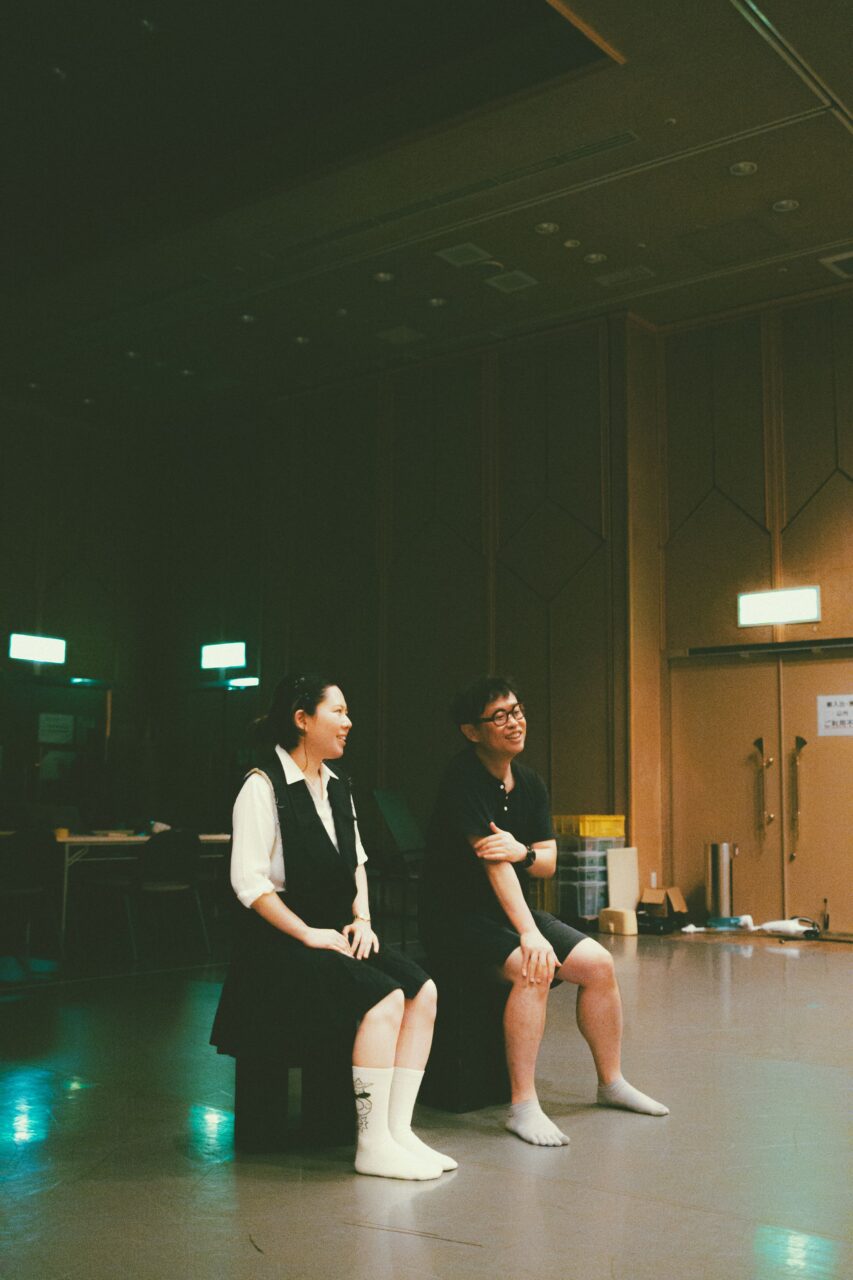
INDEX
Engagement with Music and Theater: The Acts of Listening and Watching
Nakamura: That might be different for me. As a musician, I find myself thinking about music while I listen to it.
Okada: I understand that someone who specializes in music might think about various things while listening. When I say “thinking,” I mean that if listening to a piece of music brings certain images or scenes to mind, that distracts me. If my thoughts go towards those visuals or images…
Nakamura: Does it pull you in that direction?
Okada: Exactly. I feel like that doesn’t count as truly listening to music. When I listen without any thoughts, I suddenly notice sounds like, “Oh, I never heard that sound before.” People often say they want to see theater that doesn’t require any thought. There’s a nuance in that, as it implies that my theater isn’t one that you can just enjoy without thinking. So I just respond, “Oh, really?” and think, “Wait! If you don’t want to think, why not just listen to music instead?”
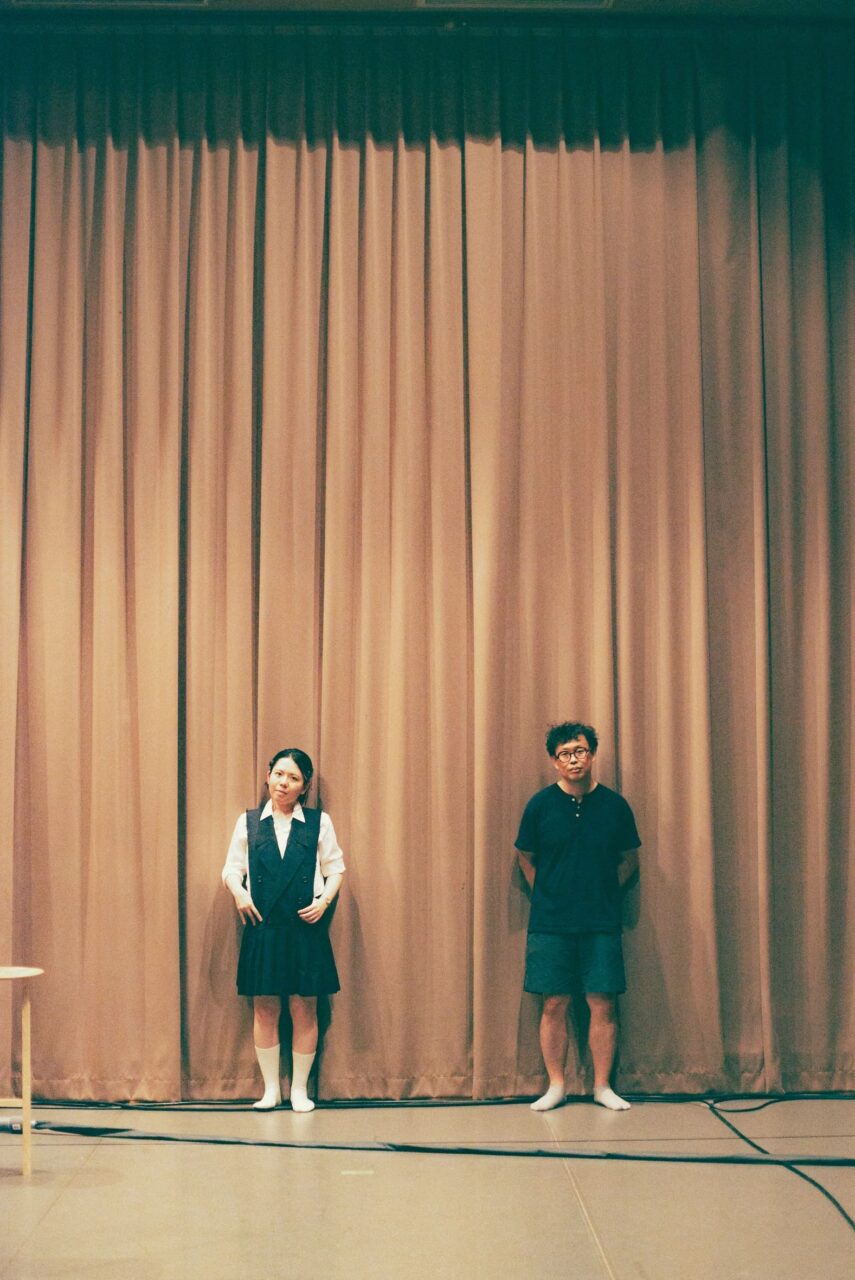
Nakamura: Since I have a background in music, I often think things like, “Oh, they selected this particular tone,” or “They must have brought in this instrument to achieve that modern sound.” Beyond that, I pay attention to the individual energy, like noticing if someone is really in the zone or seems to be having a great time. While watching a live performance, I might think, “Hmm, they don’t seem to be on their game. Are they struggling with that solo?” or “Their emotions aren’t fully coming through; I hope everything’s alright.” I suppose my ability to play an instrument gives me some insight into what they’re feeling.
Okada: That makes sense. I can also pick up on whether someone is performing well. When I observe an actor, I can often tell if they’re enjoying themselves or if they’re a skilled performer. Those are the kinds of things I notice, too.
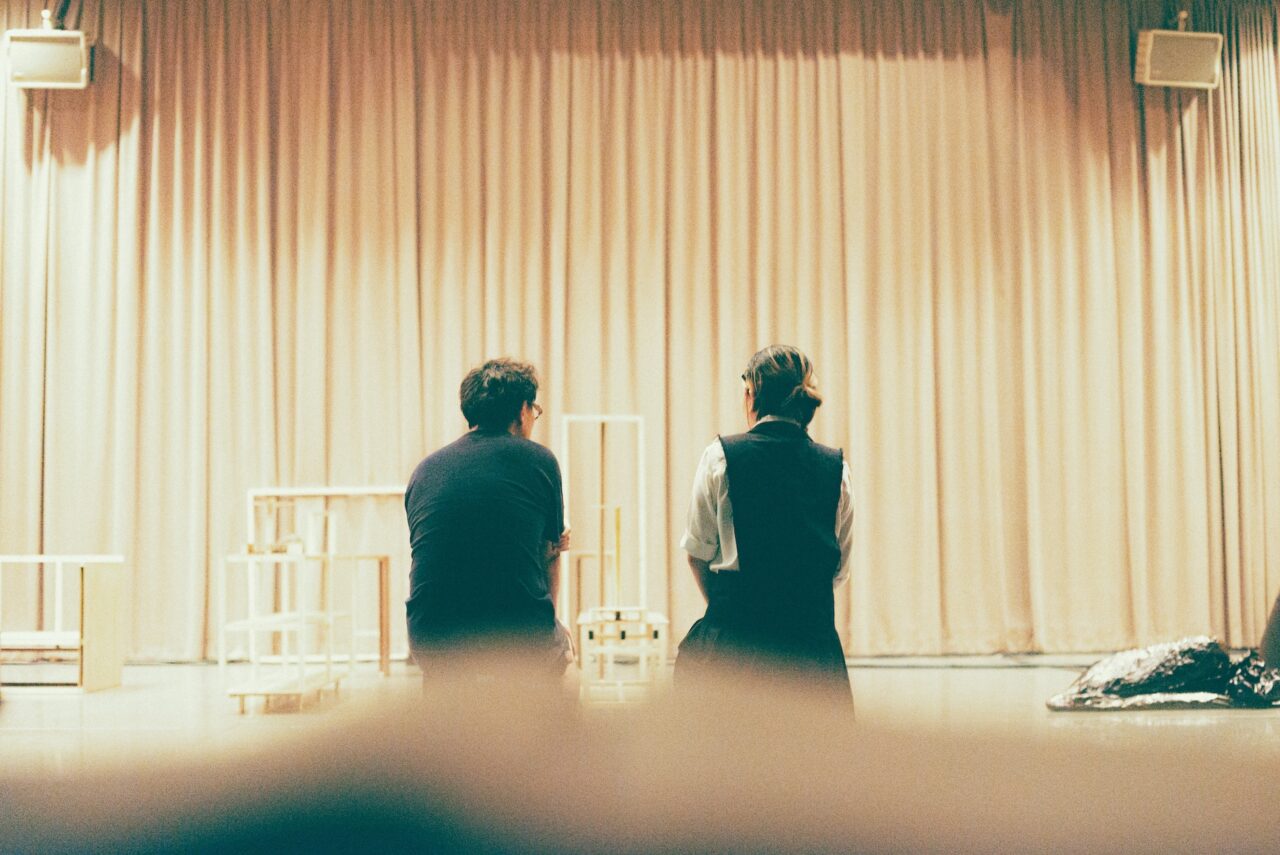
INDEX
Kaho Nakamura’s Admiration for Theater Rehearsals
Do you guys ever feel envious of each other?
Nakamura: I am envious of theater, or what I would like to do is to go into long rehearsals.
Okada: Exactly, I feel the same way! [laughs]
Nakamura: With music live performances, it’s all about assembling and dismantling the stage at an incredible speed within just one day.
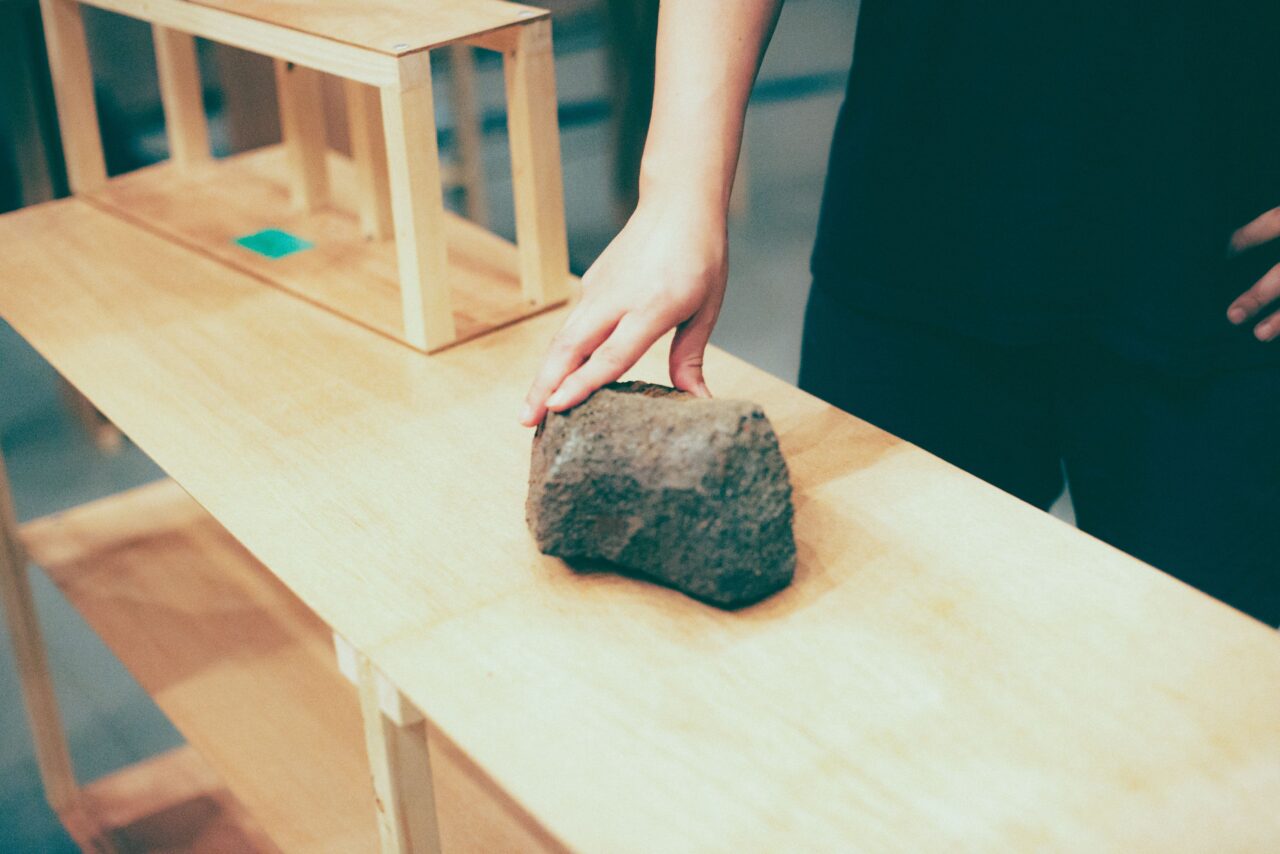
Both of you have performed overseas, but what are your thoughts on the differences in audience reactions between Japan and abroad?
Nakamura: In Japan, tightly executed performances are generally more easily understood. Sticking to a predetermined tempo and flow makes it easier to align lighting and other staging elements. Additionally, there’s a tendency for Japanese audiences to prefer clear, polished products. If emotional aspects of a performance become overly lengthy, you need to either declare in advance that it’s a performance focused on what you want to express or create an atmosphere that indicates emotionality; otherwise, the audience may feel confused. In contrast, it seems that European and Taiwanese audiences can grasp those emotions without needing such cues.
Okada: So do you decide on your live performance based on the audience’s vibe at that moment?
Nakamura: Yes, I structure my live shows in a DJ-like manner, so while performing the first song, I’m already thinking about the third or fourth one. I ask myself, “What should I play next?” During my last European tour, I found myself leaning towards slower songs. Since the Japanese MC doesn’t always translate well, I feel like I communicated more through the songs themselves.
Okada: One thing I envy about music is that, regardless of genre, the music scene is far more digitalized compared to theater. By digitalization, I don’t mean just computers; for instance, sheet music contains instructions like “play this way.” It includes nuances like playing strong/soft or fast/slow. Those nuances can be notated on sheet music. There’s no comparable format in theater that matches that. In other words, the degree of digitalization in scripts is far lower than in sheet music.
Nakamura:That’s true. Sheet music does serve as a kind of language that allows for immediate alignment of sounds. However, when you focus on each section and sound, you can see differences between those who play by looking at the sheet music, those who perform by watching the audience, and those who are attentive to the stage director while performing.
Okada: I see.
Nakamura: It varies from person to person whether they’re listening to the vocals or looking at the audience while performing, which can create a disjointed feeling during the performance. I believe it takes time to synchronize these elements when entering the rehearsal studio. For that reason, I personally want us to gather more frequently. For instance, if I simply say, “Listen to my vocals!” it leads the players to just play while listening to the song, which means they end up functioning merely as tools, contrary to my intention.
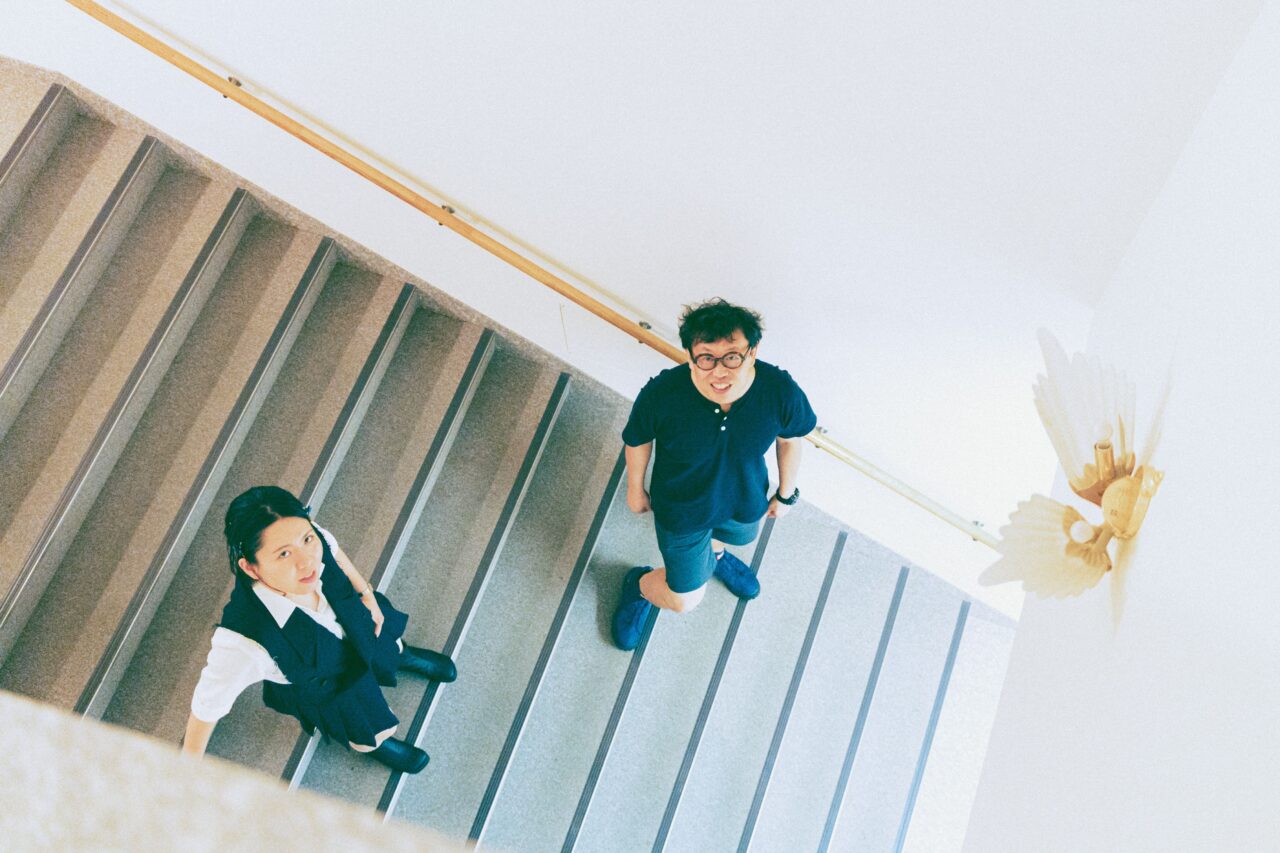
Okada: That doesn’t sound very interesting. Do you usually go on tour with the same members?
Nakamura: Yes, we often travel with the same members. However, compared to theater, we can complete things in a shorter period, so many people tend to squeeze in other jobs in between.
Okada: How long do you think you need to do what you want?
Nakamura: I’d like to try for about a month. I’ve never done it before, so I’m not sure what the best duration is. Lately, I’ve been trying to gather unnecessarily.
Okada: That sounds great.
Nakamura: I even go out of my way to book a somewhat shabby studio, preferably in the countryside. Then, I kill time at a nearby café. I’m currently experimenting with what kind of atmosphere the team develops after going through that process.
I think you’re really good at enabling the players to function. I really like Shuudai Nishida’s guitar, and I’ve seen him play in various bands, but my favorite is when he’s with your band.
Nakamura: Thank you! It’s just my theory, but I believe he’s better at improving music by going out for drinks together rather than discussing how to use sheet music. Do you feel that sense of gradually coming together during rehearsals?
Okada: I do feel that things come together. I’m not sure if that’s how I would express it, but it definitely happens. It develops and grows.
Nakamura: In the case of a revival like this one, do you feel like it’s been simmering for a while?
Okada: I’m not consciously letting it simmer, but there are often times when I realize that taking some time was beneficial. When you start rehearsals after a considerable break, it’s fun in its own way. Both letting it simmer and rehearsing while increasing the number of performances allow the work to grow, and all of that is interesting.
